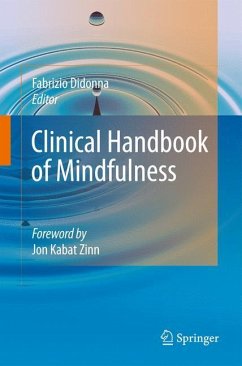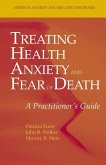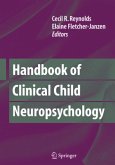Over the last two decades, Eastern psychology has provided fertile ground for therapists, as a cornerstone, a component, or an adjunct of their work. In particular, research studies are identifying the Buddhist practice of mindfulness-a non-judgmental self-observation that promotes personal awareness-as a basis for effective interventions for a variety of disorders.
The Clinical Handbook of Mindfulness is a clearly written, theory-to-practice guide to this powerful therapeutic approach (and related concepts in meditation, acceptance, and compassion) and its potential for treating a range of frequently encountered psychological problems.
Key features of the Handbook:
A neurobiological review of how mindfulness works.
Strategies for engaging patients in practicing mindfulness.
Tools and techniques for assessing mindfulness.
Interventions for high-profile conditions, including depression, anxiety, trauma
Special chapters on using mindfulness in oncology and chronic pain.
Interventions specific to children and elders,
Unique applications to inpatient settings.
Issues in professional training.
Appendix of exercises.
The Clinical Handbook of Mindfulness includes the contributions of some of the most important authors and researchers in the field of mindfulness-based interventions. It will have wide appeal among clinicians, researchers, and scholars in mental health, and its potential for application makes it an excellent reference for students and trainees.
The Clinical Handbook of Mindfulness is a clearly written, theory-to-practice guide to this powerful therapeutic approach (and related concepts in meditation, acceptance, and compassion) and its potential for treating a range of frequently encountered psychological problems.
Key features of the Handbook:
A neurobiological review of how mindfulness works.
Strategies for engaging patients in practicing mindfulness.
Tools and techniques for assessing mindfulness.
Interventions for high-profile conditions, including depression, anxiety, trauma
Special chapters on using mindfulness in oncology and chronic pain.
Interventions specific to children and elders,
Unique applications to inpatient settings.
Issues in professional training.
Appendix of exercises.
The Clinical Handbook of Mindfulness includes the contributions of some of the most important authors and researchers in the field of mindfulness-based interventions. It will have wide appeal among clinicians, researchers, and scholars in mental health, and its potential for application makes it an excellent reference for students and trainees.
From the reviews: "This book addresses the theory and clinical applications of mindfulness. ... In addition to clinicians, researchers, and scholars in psychology, psychiatry, and the social sciences who wish to more thoroughly understand mindfulness and its clinical applications, the editor intends the handbook as a reference for university students and trainees in psychology, psychiatry, social work, psychiatric nursing, and counseling. ... This book should be in the library of both those who are interested in learning about mindfulness and those who are faithful practitioners." Gary B. Kaniuk, Doody's Review Service, November, 2009 "In twenty years, this book might, as most handbooks do, take on a new role as an historical object in its own right, a marker of a creative moment in the history of an emerging field, still in its infancy..." From the foreword by Jon kabat-Zinn "This book draws together a wide range of psychological interventions that incorporate mindfulness-based practices within psychological approaches to treating mental disorders. Such a large number of positions and contribution is rare and, thus, very hard to find. This book will serve as a reference text for anyone wanting to stay up to date on the applications of mindfulness to clinical practice." Prof. Marsha Linehan, Professor of Psychology, University of Washington "This book is set to become a classic text. Open the book at any page and you find writing of extraordinary wisdom and precision. Its vision is comprehensive; and it allows us to see clearly how compelling it is when the art and science of wise investigation are brought together." Mark Williams, Ph.D., Professor of Clinical Psychology, University of Oxford "Clinical Handbook of Mindfulness is an outstanding volume that well represents the most current and cutting-edge research on the subject. ... is written in highly accessible language and is recommended for all levels of education. It is most appropriate forsomeone who is looking for a broad introduction to clinical applications of mindfulness, but it will be equally useful for those who want to be part of a new wave of experiential research that is sweeping the field." (Brent Dean Robbins, PsycCRITIQUES, Vol. 85 (8), February, 2010)
"The Clinical Handbook of Mindfulness is a welcome addition to the professional literature in psychology, psychiatry, counseling, and social work. Practicing clinicians and mental health consultants should read the book to enhance their existing knowledge of mindfulness and learn more about its therapeutic utility. The book should also be must reading for anyone interested in or conducting clinical research in the area of mindfulness. For graduate students and trainees, the book could be included in coursework and seminars devoted to therapeutic methods in clinical psychology and, in particular, cognitive behavioral therapy. I hope that the book reaches a wide audience because it is a high-quality publication worthy of widespread attention." (James K. Luiselli, May Institute, July 2010)
"The Clinical Handbook of Mindfulness is a welcome addition to the professional literature in psychology, psychiatry, counseling, and social work. Practicing clinicians and mental health consultants should read the book to enhance their existing knowledge of mindfulness and learn more about its therapeutic utility. The book should also be must reading for anyone interested in or conducting clinical research in the area of mindfulness. For graduate students and trainees, the book could be included in coursework and seminars devoted to therapeutic methods in clinical psychology and, in particular, cognitive behavioral therapy. I hope that the book reaches a wide audience because it is a high-quality publication worthy of widespread attention." (James K. Luiselli, May Institute, July 2010)








